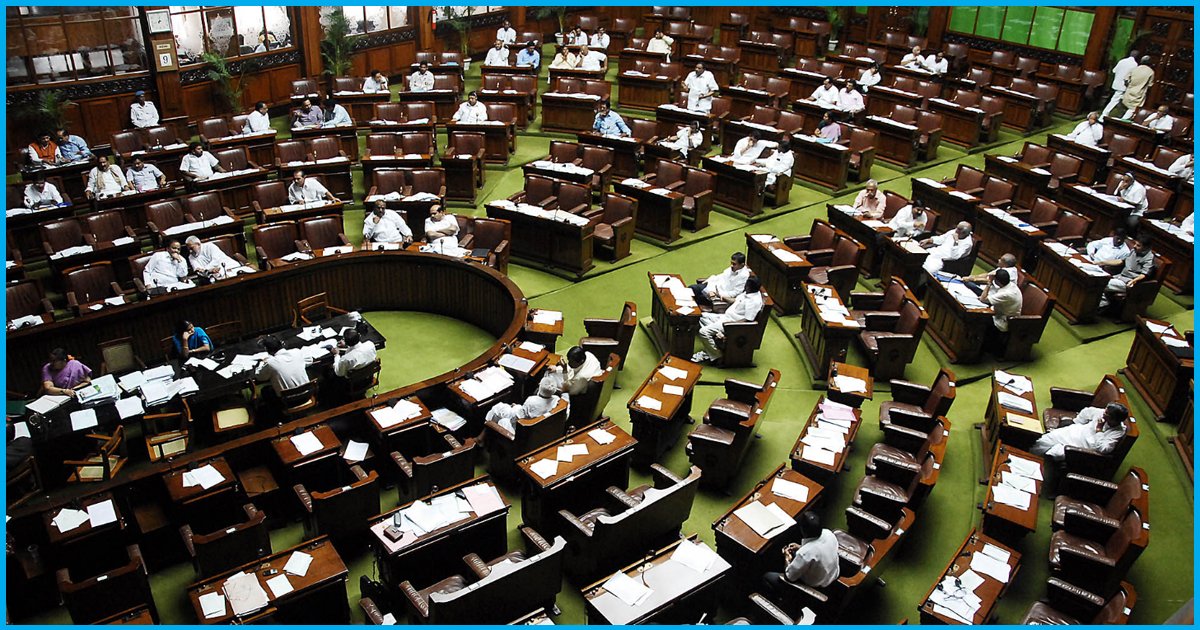Two Journalists Sentenced To One Year In Jail By Karnataka State Assembly For “Defamatory” Articles
23 Jun 2017 6:51 AM GMT
Editor : Sudhanva Shetty Shetty
Writer, coffee-addict, likes folk music & long walks in the rain. Firmly believes that there's nothing more important in a democracy than a well-informed electorate.
Two editors of two Karnataka tabloids have been sentenced to a one-year jail term and fined Rs 10,000 each for writing “defamatory” articles on two MLAs. If the editors fail to pay the fine, their jail term will be extended by six months.
“The State Assembly has decided to punish the two journalists of Kannada tabloids for publishing defamatory articles against legislators,” Karnataka Assembly Speaker KB Koliwad announced on 21 June, Wednesday, as reported by PTI.
The two editors are Ravi Belagere of ‘Hi Bangalore’ and Anil Raju of ‘Yelahanka Voice’. While Hi Bangalore was charged with publishing defamatory articles against Congress MLA from Siruguppa BM Nagaraju, Yelahanka Voice had featured defamatory articles against the BJP MLA from Yelahanka, SR Viswanath.
An article against Speaker Koliwad was also published in the September 2014 issue of Hi Bangalore.
The motion against the journalists saw MLAs from the Congress and BJP joining hands in a rare show of bipartisanship.
The two journalists do have grounds for appeal and can challenge the Assembly’s sentence against them.
Privileges Committee recommended action against the journalists
MLA Nagaraju told The Telegraph that Hi Bangalore had carried four “extremely offensive articles packed with lies about me and my family” but refused to get into the details. “I took the matter before the (then) Speaker only when I realised this magazine won’t even apologise,” he said.
Former Speaker Kagodu Thimmappa had referred the issue to the Privileges Committee after Koliwad had lodged a complaint against Belagere.
The Privileges Committee of the Assembly had recommended jail for Belagere and Raju.
“I approve the recommendation of the privilege committee which had recommended a year’s imprisonment and a fine of Rs 10,000 on Hi Bangalore and Yelahanka Voice editors,” Koliwad said.
Constitutionality
The Articles of the Constitution that deal with the privileges and powers of Members of Parliament and of Legislative Assemblies are Article 105 and Article 194 respectively.
Speaking to Bangalore Mirror, Belagare said, “There is no need to attach so much importance to this order as we can appeal before the HC and SC. I am yet to get a copy of the order. Previously, I was ordered to undergo six months of imprisonment. Soon after Koliwad became Speaker, it has been increased to one year. I have high regards for the Speaker.”
The Logical Indian take
Here, there are three main issues to address:
- Should press freedom have limits defined by politicians or the courts (or should it not have any constitutionally defined limits at all)?
- Should a defamation case against legislators be deliberated on by the legislators themselves?
- What are the judicial rights of legislators?
Firstly, it goes without saying that India does not have a spotless record when it comes to freedom of expression and press freedom. India is ranked 136 in a list of 180 countries according to the World Press Freedom Index, with jingoism and self-censorship termed as the main reasons for the low ranking. In such a scenario, one cannot deny that powerful politicians taking it upon themselves to punish journalists will reflect poorly on journalistic freedom.
That does not mean that defamation is not an offence in India. Defamation cases are filed on a regular basis in our country’s courts. But in this case, there is a unique component of the parties involved in a case also being judges of the case. It goes against natural justice and common sense for a man to judge his own case.
Lastly, there is a difference between a court deliberating on a defamation case and a state Assembly deliberating on the same. Judges are bound by the Constitution; politicians are bound by politics. The case in the Karnataka Assembly was not the first of its kind; many state Assemblies have followed such trajectories in the past.
In recent months, there has emerged a debate over judicial overreach by the courts, of courts not merely recommending legislations but also enforcing them, thereby creating a “legislative judiciary”, so to speak. But if cases like the one in Karnataka this week become the norm, there will emerge a new paradox – one of a “judicial legislature”.
The Constitution clearly assigns different roles to the branches of government, and the legislature is tasked with making laws. When the legislature takes it upon itself to pass judgements, the lines between the branches of government become blurred and this will not bode well for the health of a democracy.
The fact that the two editors have the option of appealing to the courts is besides the point – the debate is over whether an Assembly can be entrusted with dispensing justice in cases involving its own politicians. The answer is a clear, wholesome “No.” We need to hold our leaders accountable and that can only happen when our approach to politicians is adversarial in nature.
The Logical Indian hopes that the courts take a more nuanced stance on this issue and legislatures across the country do not make a habit of dispensing the duties of the judiciary – especially in cases involving its own politicians.
 All section
All section














